Characteristics of Corporate Psychopaths and Their Corporations
Summary by J. Scarlet
From the books, Snakes in Suits by Dr. Paul Babiak & Dr. Robert Hare, Corporate Psychopaths by Dr. Clive Boddy, Working with Monsters by Dr. John Clarke & Without Conscience by Dr. Robert Hare
“It is important to study [corporate] psychopaths because of the large-scale financial, environmental and human resources that many modern international corporations have at their disposal. Many corporations are bigger financially than some nation-states: of the 100 largest economic entities in 2002, 50% were corporations,” (Boddy, 6). The actions of some senior managers have destroyed corporations and such collapses have become more common in recent years, (1). When these managers lie about their involvement in such catastrophes, walk away with huge payoffs and seemingly unaffected by the lives they have devastated, normal people wonder what kind of person would behave this way. It is my hope that by compiling this paper the reader will understand the traits of corporate psychopathy and why it is important that employers screen for them.
Dr. Robert Hare states that a portion of the PCL-R (Psychopathy Checklist-Revised), which was created to detect violent criminal psychopaths, also identifies corporate psychopaths, (Boddy, 7). According to Dr. Hare, corporate psychopaths are glib, superficially charming, have a grandiose sense of self-worth, are pathological liars, conning, manipulative, lack remorse, are emotionally shallow, callous, lack empathy, and fail to take responsibility for their actions, (39). He believes that criminal and anti-social definitions of psychopathy are inappropriate for corporate psychopaths so a revised definition should be used to detect them.
All psychopaths thrive off of the feelings of power and control they get from dominating their victims, but corporate psychopaths victimize people in primarily psychological ways, (Clarke, 10). They seek out leadership positions because money, power, status and control are what make them tick, (Boddy, 5). “Some psychopaths are violent and end up in jail; others forge careers in corporations.” (1).
Corporate psychopaths can control their behavior and that of others much more effectively than violent criminal psychopaths can, (Boddy, 42). Although they appear charming, charismatic and likeable, corporate psychopaths are emotionally disconnected to others, viewing them as objects to be used, (2). Of their psychopathic traits, the least noticeable are their manipulative behaviors and callousness, (42).
It is not difficult for these psychopaths to rise to very high levels in corporations, particularly in today’s uncertain and constantly changing corporate climates, (Clarke, 10). There are actually three and a half times more psychopaths in senior managerial positions than there are in the general population, (Boddy, 104). The managerial positions they move into exceed their abilities, but they are able to attain these positions because of the false personas they create, (3). Corporate psychopaths masterfully fool others into believing they are talented and trustworthy, but in reality their behavior is extremely destructive, (2).
According to studies conducted by Dr. Clive Boddy, corporate psychopaths accounted for 26% of workplace bullying, (Boddy, 44). When they were present in an organization, 93.3% of the employees witnessed bullying in the workplace, (60). When they were not present, the percentage was 54.7%. Not all corporate psychopaths are bullies, but the ones who are tend to be more abusive than charming, (Babiak & Hare, 187). They humiliate, intimidate, harass and scare their victims, and will become vindictive if they don’t get what they want, (Boddy, 44). They also encourage others to act these ways and such behaviors can spread through companies like a virus, (59). “Employees who worked in organizations where corporate psychopaths were present experienced people yelling at them at work more than five times more frequently than did employees who worked in organizations where corporate psychopaths were not present,” (58).
Unethical leaders create unethical followers, which in turn create unethical companies and society suffers as a result, (Boddy, 169). The more corporate psychopaths there are in a corporation, the less the corporation is socially responsible, environmentally friendly, beneficial to the community, and committed to its employees, (69). Based on his research, Dr. Boddy developed the Corporate Psychopaths Theory of the Global Financial Crisis: that corporate psychopaths, rising to senior positions within corporations, where they have considerable power and influence over the climates of the organizations have largely caused the financial crisis we are experiencing today, (164).
As Dr. Hare states in his book, Without Conscience, “If we can’t spot them, we are doomed to be their victims, both as individuals and as a society,” (Hare, 6). Dr. Hare teamed up with Dr. Paul Babiak to develop the B Scan, a diagnostic tool used to screen for dysfunctional behavior in organizations. More information can be found at http://www.b-scan.com/.
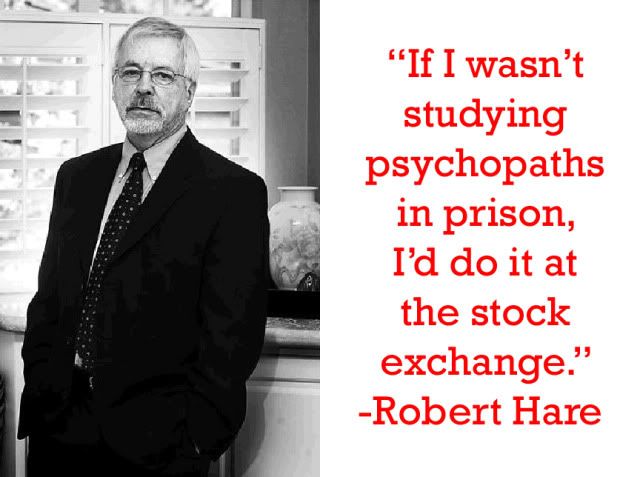
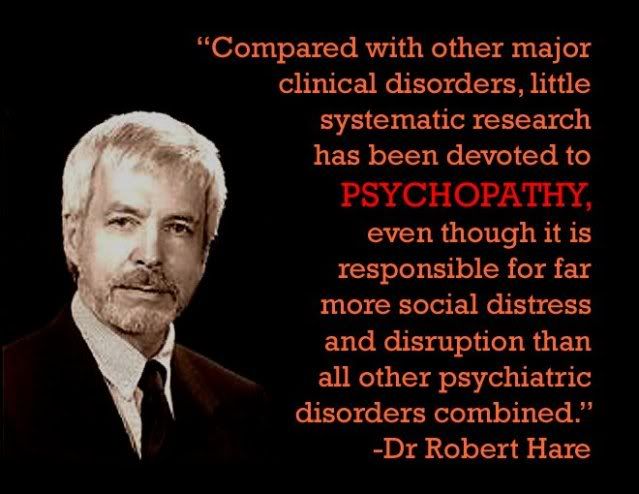
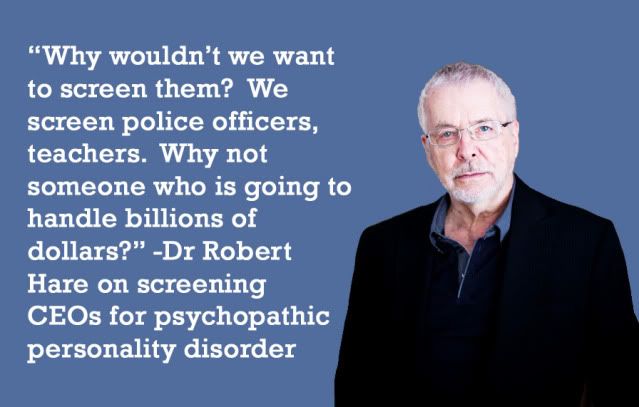
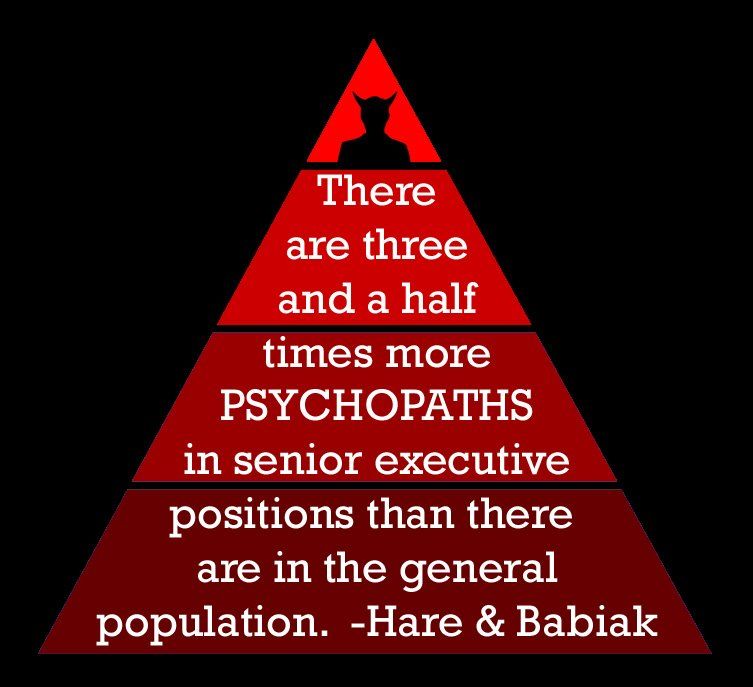
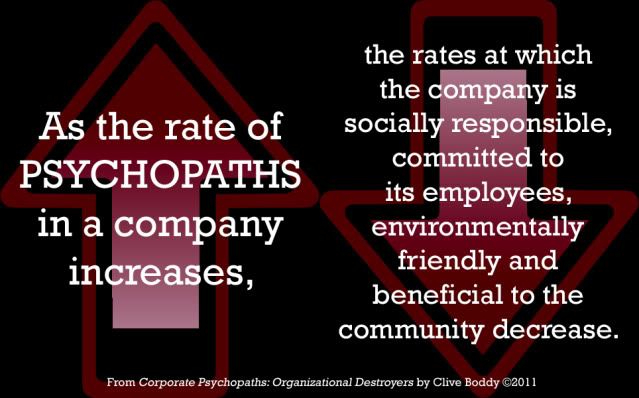

Having been in business 25 years – and in management of Footsie companies, for the last nine, I can testify to the reality, but when profit means ‘fighting’ the competition – a truism – then what outcome other than gladiatorial personas can we expect?
I feel the same theory applies to politicians.These are able to rise to positions of power beyond their abilities.Influence some and over-ride the wise.
Making poor financial decisions and even more importantly attempting by invasion to increase their importance and make a mark in history.
This results in political instability of the invaded country,unnecessary deaths of our military and non combatants .Ultimately achieving nothing.
Boy you hit that one right on the nail, didn’t you?
Just received this recall today, my son was burned alive driving this car in December of 2006. The switch was found and tested found to be defective. Experts agreed that the switch caused the fire hence the deaths of my son and his girlfriend. Detroit’s Federal Judge dismissed my case! Ford is a perfect example of premeditated murder going on in large corporations!
I’m so sorry.
Pingback: Brian Hunter – a “corporate psychopath”?? – ddroverblog
This is such important information, thank you. I believe we live in a global Oligarchy and we all need to wake up and vote accordingly before it is too late and we have nothing left of our lives as we know them. We are seeing the world fall apart as it is succumbing to the power of the evil corporation.